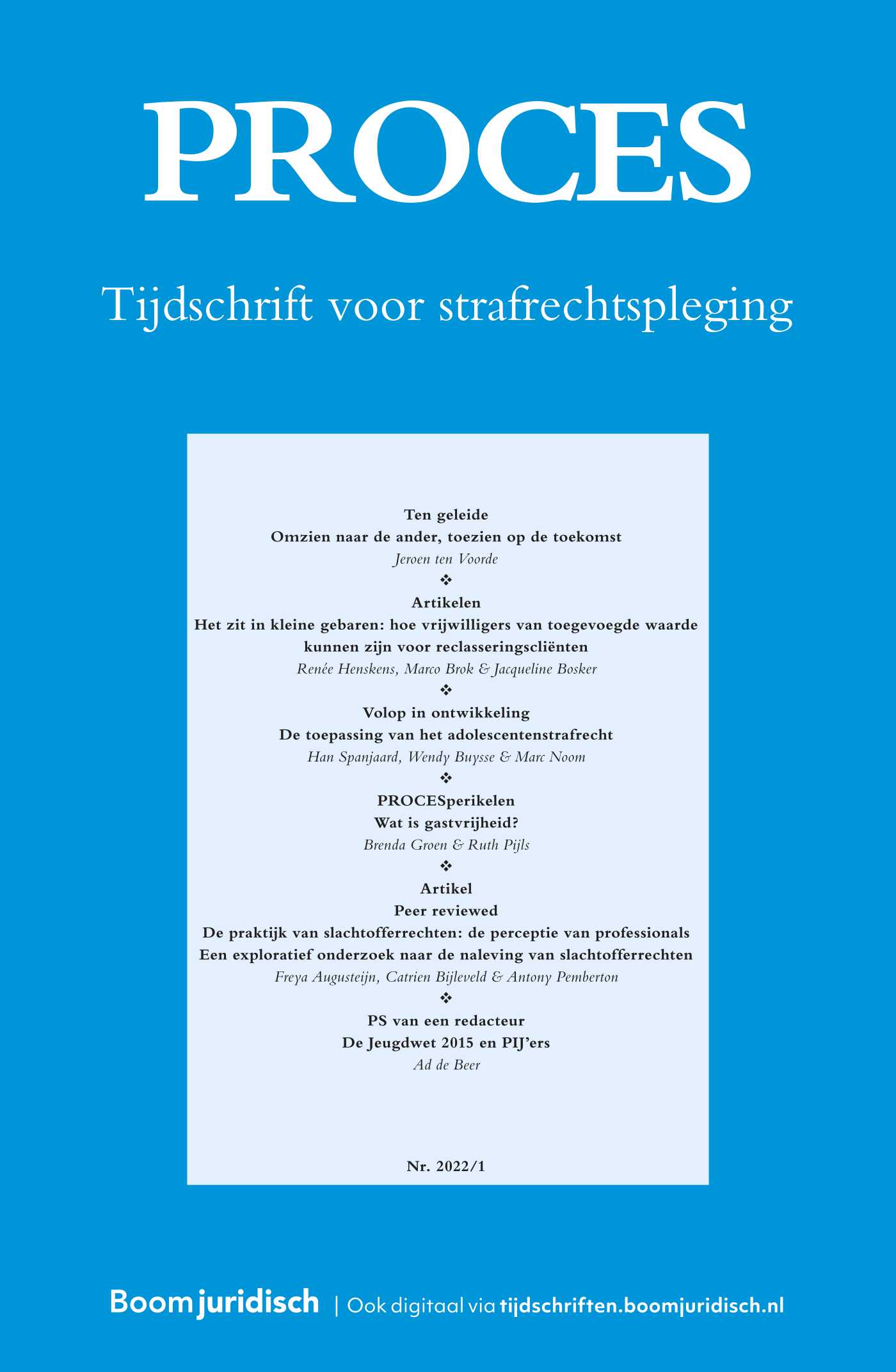|
In their article on the victim orientation in the combat against human trafficking – in particular labour exploitation – Cleiren, Van der Leun and Van Meeteren highlight the limitations of the protection of victims in practice. Based on a brief legal analysis and a secondary reading of the empirical literature, they conclude that the rights of victims remain subordinate to the main aims of the relevant legal domains: criminal law and immigration law. In addition, the practices-based analysis shows a mismatch between a victim-oriented approach and preferences and perceptions of many migrants involved as well as existing tensions between different legal domains. |


PROCES
Meer op het gebied van Criminologie en veiligheid
Over dit tijdschriftMeld u zich hier aan voor de attendering op dit tijdschrift zodat u direct een mail ontvangt als er een nieuw digitaal nummer is verschenen en u de artikelen online kunt lezen.
| Redactioneel |
Slachtoffers in de (straf)rechtspleging: a one way story? |
| Auteurs | Prof. mr. dr. Jeroen Ten Voorde en Dr. mr. Maarten Kunst |
| Auteursinformatie |
| Artikel |
Beperkingen aan en dilemma’s van de slachtoffergerichte aanpak van mensenhandel; een blik op arbeidsuitbuiting. |
| Trefwoorden | Slachtoffers, Mensenhandel, Arbeidsuitbuiting, Immigratiebeleid |
| Auteurs | Prof. mr. dr. Tineke Cleiren, Prof. dr. Joanne van der Leun en Dr. Masja Van Meeteren |
| SamenvattingAuteursinformatie |
| Artikel |
Schadevergoedingsregelingen voor slachtofferschap van seksueel misbruik: kwetsbaar voor fraude? |
| Trefwoorden | Schadevergoedingsregelingen, Slachtofferschap, Seksueel misbruik, Fraude |
| Auteurs | Dr. mr. Maarten Kunst |
| SamenvattingAuteursinformatie |
|
Lately, several private and public compensation schemes have been established in the Netherlands for people who have been sexually abused as a minor by representatives of the Catholic Church, childcare workers or foster parents. Eligible for compensation are those who can make a reasonable case of the likelihood that they have been sexually abused. They do not have to provide indisputable proof of the abuse. The author of this article argues that this low burden of proof makes these compensation schemes vulnerable to fraud. He supports his argumentation with several examples of dishonest victims who have been unmasked as fraudsters. Furthermore, he explains that undetected fraud can have several adverse by-effects, such as the condemnation of falsely accused persons and impairment of the credibility of compensation schemes and agencies that run such schemes. The author concludes with emphasizing the need for more explicit policies on fraud prevention, detection, and control. |
| Praktijk |
Dadendrang |
| Auteurs | Mr. Justus Candido |
| Auteursinformatie |
| Artikel |
Slachtoffer-daderoverlap bij partnergeweld in Nederland: implicaties voor de Wet tijdelijk huisverbod |
| Trefwoorden | Slachtoffer-daderoverlap, Partnergeweld, Wet tijdelijk huisverbod |
| Auteurs | Dr. Karlijn F. Kuijpers |
| SamenvattingAuteursinformatie |
|
Although there is evidence for a victim-offender overlap for various crimes, specific empirical research into a victim-offender overlap for intimate partner violence is scarce. The current study empirically examines the presence of a victim-offender overlap among 156 victims of partner violence recruited at Dutch service organizations. Results show a clear victim-offender overlap, especially for behaviors of psychological partner violence and to a lesser degree for physical partner violence. Implications of these findings for the Dutch law on temporary restraining orders are discussed. |
| Artikel |
‘Moral hazard’ onder slachtoffers van identiteitsfraude? De relatie tussen schadevergoeding bij onterechte bankafschrijvingen en riskant internetgedrag |
| Trefwoorden | Identiteitsfraude, Schadevergoeding, Online activiteiten, Onbedoelde gevolgen |
| Auteurs | Dr. Johan Van Wilsem en Levy Paulissen MSc |
| SamenvattingAuteursinformatie |
|
Due to digitalization of modern societies, identity fraud is becoming a serious problem. Until recently, Dutch victims of unauthorized cash withdrawals from their bank accounts were reimbursed by their banks in most instances. Because most victims were not confronted with financial damages, this generous reimbursement policy may have unintendedly stimulated moral hazard among victims, due to a lack of incentives to change risky behavior and avoid future victimization. This paper therefore compares post-victimization changes in Internet activities among reimbursed victims of identity fraud and non-reimbursed victims, as well as non-victims. For this purpose, large-scale, representative victimization survey data were used from the Dutch LISS-panel. Overall, we found no differences in Internet activity change between the distinguished groups, which points to the absence of moral hazard in this specific case. |
| Artikel |
Slachtoffers van onrecht: de psychologie van secundaire victimisatie (en positieve reacties voor slachtoffers) |
| Trefwoorden | slachtofferrechten, just-world theorie, negatieve reacties richting slachtoffers, steun richting slachtoffers |
| Auteurs | Dr. Michèlle Bal |
| SamenvattingAuteursinformatie |
|
Victims play an increasingly more prominent role in the criminal justice process. While the consequences of victim participation in the judicial process have been criticized by researchers and practitioners alike, the possible negative consequences of secondary victimization has been largely neglected in this debate. From a social psychological perspective, I discuss research on just-world theory that can explain these negative reactions and give some insight into the processes that play a role in both negative and positive reactions toward victims. Implications for the law practitioners and scholars will be discussed. |
| Column |
Man bijt hond. Voorbij het speciecisme |
| Auteurs | Dr. Janine Janssen |
| Auteursinformatie |
